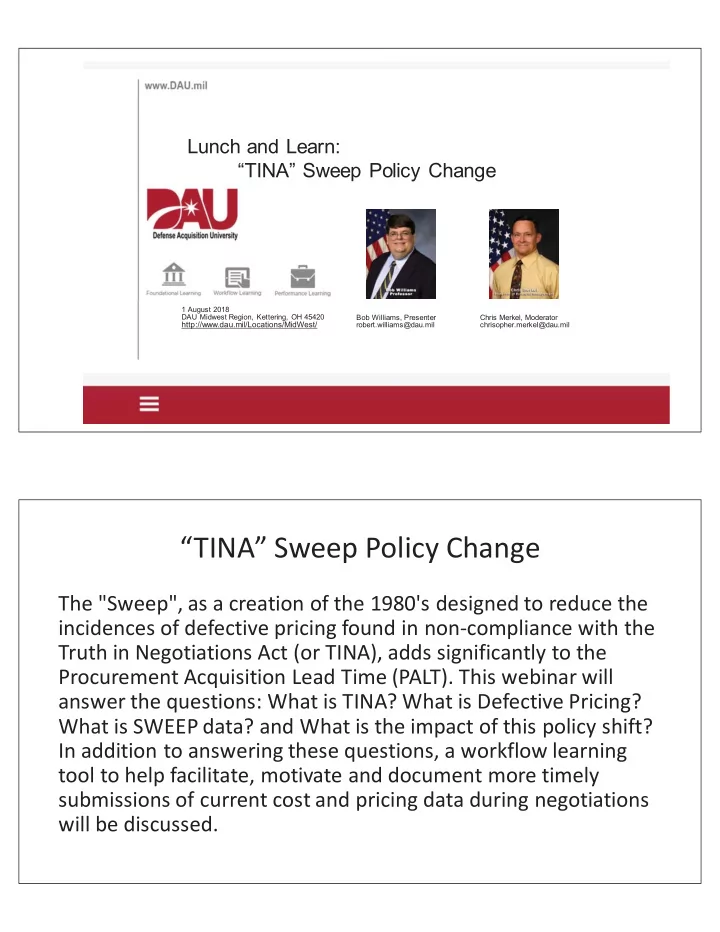

Lunch and Learn: “TINA” Sweep Policy Change 1 August 2018 DAU Midwest Region, Kettering, OH 45420 Bob Williams, Presenter Chris Merkel, Moderator http://www.dau.mil/Locations/MidWest/ robert.williams@dau.mil chrisopher.merkel@dau.mil “TINA” Sweep Policy Change The "Sweep", as a creation of the 1980's designed to reduce the incidences of defective pricing found in non-compliance with the Truth in Negotiations Act (or TINA), adds significantly to the Procurement Acquisition Lead Time (PALT). This webinar will answer the questions: What is TINA? What is Defective Pricing? What is SWEEP data? and What is the impact of this policy shift? In addition to answering these questions, a workflow learning tool to help facilitate, motivate and document more timely submissions of current cost and pricing data during negotiations will be discussed.
Disclaimer The materials available in this presentation are for informational purposes only and not for the purpose of providing legal advice. You should contact your program attorney to obtain advice with respect to any particular issue or problem. The opinions expressed at or through this presentation are the opinions of the individual presenter and may not reflect the opinions of the DoD or DAU. Adequate Disclosure? Yes, No? Why, why not? • Contractor makes their local DCAA (Defense Contract Audit Agency) office aware of the existence of more current factual data? • NOT an adequate disclosure – • Disclosure needs to be made to the “Government representatives involved in the proposed procurement” . . . • specifically to those making “judgements on Pricing.” (i.e. the individual, or team, designated to conduct the price negotiations)
Adequate Disclosure? Yes, No? Why, why not? • Contractor makes their local DCAA auditor, who had performed the pre-award audit of the proposal 2 months ago, aware of the existence of more current factual data? • NOT an adequate disclosure – • Was the auditor brought in and made part of the price negotiation team, or were they more likely working on other subsequent audit assignments? • Regardless of auditor’s status - the later data’s significance (impact), relative to the proposal, was not disclosed. Adequate Disclosure? Yes, No? Why, why not? • Contractor provides their local DCAA auditor, who had performed the pre-award audit of the proposal 2 months ago, an impact statement that their proposed cost would/should be reduced by a sum certain amount as a result of more current factual data in their plant? • (Arguably?) NOT an adequate disclosure – • Was the auditor brought in and made part of the price negotiation team, or were they more likely working on other subsequent audit assignments? • Rather than leave the “negotiation team” to be matter of interpretation, make it clear, by notice, there is only one individual (contracting officer) making judgements on price in negotiations.
Cost or Pricing Data? Yes, No? Why, why not? • Contractor refuses to provide actual, current purchase orders on a sampling of parts claiming that is not the basis of their estimate (BOE) used in their proposal of record. Is it cost or pricing data requiring disclosure? • Yes, it is cost or pricing data. It is information of a factual nature that a prudent buyer or seller would reasonably expect to affect price. [10 U.S.C. § 2306a(h)(1)] The fact that a contractor’s estimate (judgement) would not be based on these facts, does not negate that a prudent buyer would expect to base their estimate on such facts. The contractor may choose to not update their price negotiation position to recognize these facts, but they should nevertheless be disclosed to the Government. Cost or Pricing Data? Yes, No? Why, why not? • Contractor completes and submits SWEEP disclosure within five (5) days after date of agreement on price to satisfy new SWEEP policy of June 2018. To offset a downward adjustment of material costs as a result of subcontract negotiations completed six weeks prior, the contractor also submits a revised engineering estimate completed two days before submitting the SWEEP along with their certificate. Does the revised engineering estimate qualify as cost or pricing data for which the offset should be granted? • No, it does not qualify as cost or pricing data. Cost or pricing data are factual in nature, not estimating judgement; plus it didn’t become available until after the date of agreement on price. Although there is no prohibition on offsets crossing elements of cost (engineering cost may offset material cost), the revised engineering estimate does not qualify as cost or pricing data on two counts. Thus it cannot be used to offset the reduction in material cost. An administrative contract price reduction, including profit/fee, will need to be made sometime after awarding the contract (but before delivery payment so as to avoid accruing interest charges).
Recommend
More recommend